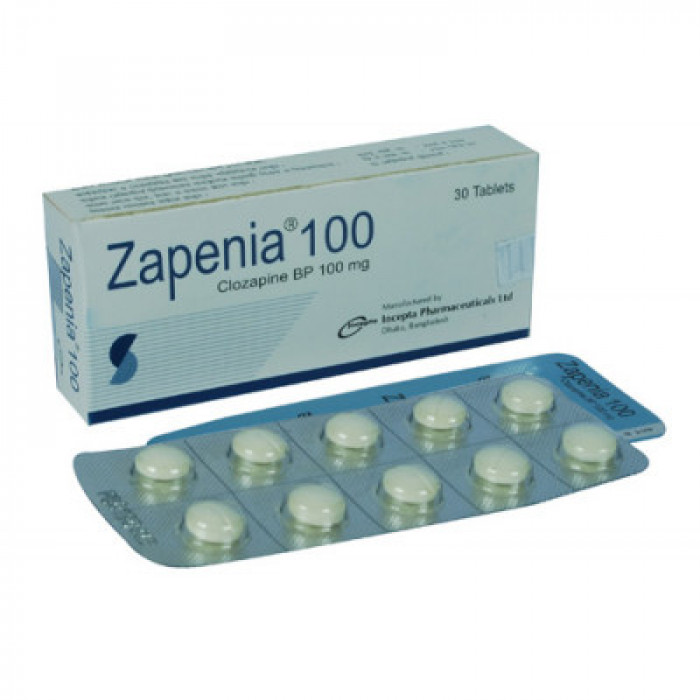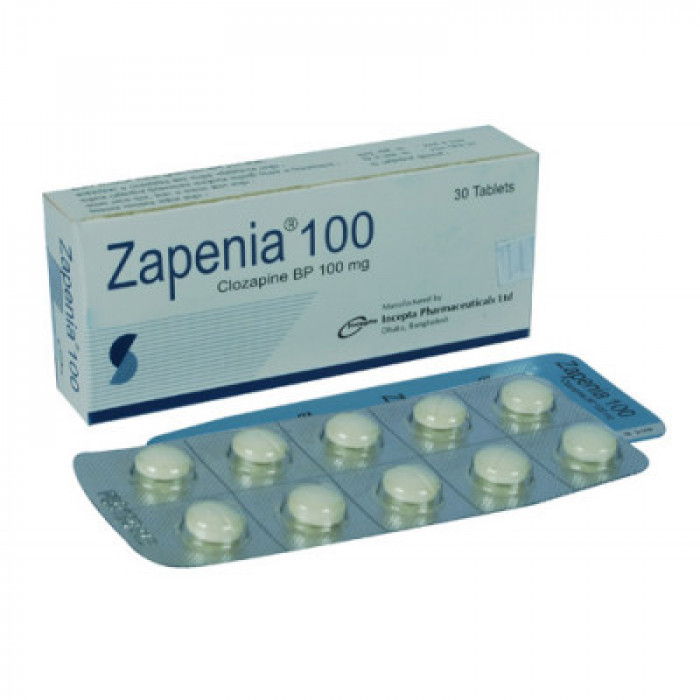
✔ 100% Authentic Product
👁️ Currently Viewing 2568
Sizopin 100mg Tablet 10pcs
Schizophrenia is a mental disorder in which a person’s thinking ability, feelings, and behavior become abnormal. Sizopin 100 helps restore the chemical imbalances in the brain that are responsible for such changes. It improves thoughts, and behavior and enhances the quality of life.
📄Prescription Required
Discount
Price: ৳ 95
MRP:
৳
100
5%
Off
✅ Description:
Sizopin 100 Tablet is an antipsychotic medication used to treat schizophrenia, a mental disorder that impairs thinking, emotions, and behavior. It alters brain chemicals to improve symptoms.
Common side effects of Sizopin 100 Tablet include agranulocytosis (a serious drop in white blood cells), drowsiness, tremors, sedation, insomnia, excessive salivation, weight gain, constipation, and irregular heartbeat. While many of these side effects may subside over time, never stop the medication without consulting a doctor. Seek immediate medical attention if you experience severe allergic reactions like skin rashes, swelling, or difficulty breathing.
Sizopin 100 Tablets can be taken with or without food, according to your doctor's instructions. Avoid alcohol and activities like driving or operating heavy machinery during treatment due to the risk of drowsiness. It is not recommended during breastfeeding, and you should consult your doctor if you are pregnant or planning to become pregnant. This medicine should be used cautiously in patients with heart, liver, or kidney issues and is not recommended for children under 16 years of age.
Safety Advices

Alcohol
UNSAFE
Consumption of alcohol during treatment with Sizopin 100 is not recommended due to an increased risk of severe side effects such as dizziness, confusion, impaired judgment, nausea, and vomiting. Additionally, alcohol may worsen concentration and coordination, so avoid activities like driving or operating machinery while on this medication.

Pregnancy
CONSULT YOUR DOCTOR
Regarding pregnancy, this medication is generally avoided unless necessary. Your doctor will assess the risks and benefits before prescribing it.

Breastfeeding
UNSAFE
Sizopin 100 is not recommended for use during breastfeeding.

Driving
UNSAFE
Sizopin 100mg Tablet may cause side effects which could affect your ability to drive.

Kidney
CONSULT YOUR DOCTOR
Sizopin 100 Tablet should be used cautiously, and a dose adjustment may be required depending on your health. It's important to consult your doctor for guidance.

Liver
CONSULT YOUR DOCTOR
Sizopin 100 Tablet should be used cautiously, and a dose adjustment may be required depending on your health. It's important to consult your doctor for guidance.
✔️ Uses of Sizopin 100
- Schizophrenia
✔️ How does Sizopin 100 work?
Sizopin 100 works by binding to certain receptors and inhibiting the release of the chemical substances that cause psychotic symptoms.
✔️ Side Effects of Sizopin 100
Common side effects include constipation, dizziness, drowsiness, headaches, and excessive salivation. Less frequent effects include dry mouth, abdominal discomfort, and unexpected weight gain.
✔️ Quick Suggestions:
- Sizopin 100mg Tablet helps treat schizophrenia in people for whom other medicines are ineffective or not tolerated.
- Take it with or without food, preferably at the same time every day.
- It can cause dizziness and sleepiness. Be cautious while driving or doing anything that requires concentration.
- It may cause low blood pressure and dehydration. Drink plenty of fluids and rise slowly from a sitting or lying position.
- It may increase your weight, blood sugar, and cholesterol. Eat healthy, exercise regularly, and monitor your blood levels regularly.
- Your doctor may get regular blood tests done to monitor your blood cells during treatment with this medicine. Inform your doctor immediately if you notice any signs of infection such as fever, sore throat, or rash.
- Do not stop taking Sizopin 100mg Tablet without talking to your doctor first as it may cause worsening of symptoms.
✔️ Indication of Sizopin 100
Sizopin (Clozapine) is primarily used to treat schizophrenia in patients resistant to or intolerant of traditional antipsychotic medications. It is also indicated for managing psychosis related to Parkinson's disease.
✔️ Pharmacology
Clozapine is an atypical antipsychotic that binds to dopamine receptors differently than typical antipsychotics, particularly with a high affinity for the D4 receptor. This selective binding reduces extrapyramidal side effects, as Clozapine is more active in limbic dopamine receptors than striatal ones. It also antagonizes adrenergic, cholinergic, histaminergic, and dopaminergic receptors.
✔️ Dosage & Administration of Sizopin 100
- Schizophrenia: Start with 12.5 mg once or twice daily, gradually increasing to a target dose of 200-450 mg/day (maximum 900 mg/day).
- Parkinson's disease-related psychosis: Start with 12.5 mg at bedtime, gradually increasing to a usual range of 25-37.5 mg, with a maximum dose of 100 mg/day.
✔️ Interaction
Clozapine may interact with other CNS-active drugs and alcohol, potentially causing orthostatic hypotension. Its high protein-binding affinity may lead to displacement interactions with medications like warfarin and digoxin. Carbamazepine and Clozapine should not be used together, as Carbamazepine can lower Clozapine levels.
✔️ Contraindications
Clozapine is contraindicated in patients with severe cardiac disorders, renal impairment (creatinine clearance <10 mL/min), a history of neutropenia or agranulocytosis, bone marrow disorders, paralytic ileus, and severe CNS depression.
✔️ Pregnancy & Lactation
Clozapine has not been well-studied in pregnant women. It should be used in pregnancy only if necessary. Clozapine is excreted in animal milk, and breastfeeding should be avoided while on this medication.
✔️ Precautions & Warnings
Clozapine must be discontinued gradually to avoid withdrawal symptoms like psychosis and cholinergic rebound. Agranulocytosis is a serious side effect, so weekly WBC monitoring is required during the first six months, followed by biweekly checks. Clozapine can cause cognitive impairment, seizures, hyperglycemia, and other complications, particularly in the elderly and those with pre-existing conditions.
✔️ Storage:
Store below 30°C, away from light and out of reach of children.
⚠️Disclaimer:
At ePharma, we’re committed to providing accurate and accessible health information. However, all content is intended for informational purposes only and should not replace medical advice from a qualified physician. Please consult your healthcare provider for personalized guidance. We aim to support, not substitute, the doctor-patient relationship.










